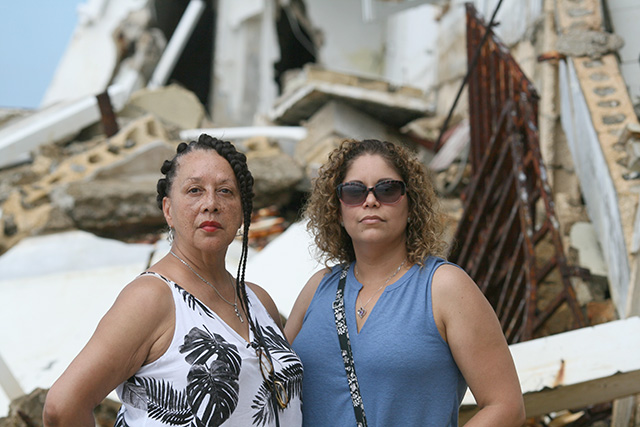"Around the College" is no longer being updated.
View current SUNY Empire Stories.
September 25, 2019
Grant-funded Oral History Project on Hurricanes Irma and Maria Field Work Underway
Professors Matias and Aird Interviews with Puerto Rico and US Virgin Islands Storm Survivors

Interviews with survivors of Hurricanes Irma and Maria are now underway as part of “An Oral History of Hurricane Irma and Maria: A Social, Cultural, and Environmental Crisis in Puerto Rico and the U.S.V.I,” a grant-funded project, awarded to SUNY Empire State College Department of Natural Sciences Associate Professor Audeliz Matias and Associate Professor and Interim Director of European Academic Programs Sheila Marie Aird, by the Oral History Association Awards’ Emerging Crisis Oral History Research Fund.
Friday, Sept. 20, 2019, represented the two-year anniversary of Maria impacting Puerto Rico and, since that time, Matias and Aird received grant funding, organized the project and began their field research.
Both members of SUNY Empire’s faculty trace family roots to the Caribbean: Matias is Puerto Rican and Aird’s family is from Grenada. The interviews took place on the western side of the Puerto Rico, which was severely affected by the storm surge, flooding, and land failure during and after Maria.
"To say this was a humbling experience does not capture how open and responsive people were in talking with us and sharing their experiences. Oftentimes, the people who have lived in a community are keenly aware of important details that help to understand not only the actual act but possibly the precursor to the event as well," said Aird.
Matias said, "Listening to the stories from September 20, 2017 was not easy, and the citizens voices will always have a special meaning to me. As a Puerto Rican, it is very hard to see that many of the damaged properties were abandoned and will never be rebuilt. On the other hand, as a geologist, documenting the environmental changes caused by Maria through the oral histories serve as a reminder of the connection between science and society."
The project was designed to collect first hand narratives, two years after the devastating 2017 hurricanes impacted the islands.
An underlying project premise requires a cross section of voices included in the collection and Matias and Aird wanted to include as many individuals as possible from different backgrounds and locations to demonstrate the human experience.
The first phase of the field research interviews included local residents, geologists, chancellors from a private higher education institution, a biologist, and others that survived the natural disaster. SUNY Empire Provost and Executive Vice President for Academic Affairs Meg Benke facilitated some of the subject interviews.
The next phase will include interviews conducted in the U.S. Virgin Islands.
As they worked collecting the stories, Matias and Aird discovered how important it was for people to share their experience as well as offer additional connections.
The research is important from several vantage points.
"We want to collect data not only on the social and cultural impact, but additionally posit the environmental consequences that are important to understanding these particular crises long-term. As a result, it was important from the onset, to allow the persons interviewed to speak their truth, discuss how and when they were impacted and to explain the event on their terms," said Aird.
"It was also very important for us to understand the environmental impact not only from a scientific perspective but also as a window into which to view both the pre- and post-aftermath," added Matias.
